Last Updated on June 29, 2022 by Rebecca Huff
Jet lag can really take it's toll when you are traveling for business or pleasure. Technically, we can't add more hours to our day and many times our schedules are so full that we can't imagine going to bed even half an hour earlier. When it comes to sleep and jet lag, the consensus seems to be to suffer through.
You can reduce your recovery time from jet lag with a little forethought. The key is to make sleep a real priority even when you are not traveling. When something comes up, many of us cut back on sleep to fit in other commitments. Problems arise because we think that we can “catch up” on sleep over the weekend, or even on vacation. That's not a long term solution for sleep deprivation.
Your brain is much more complicated when it comes to your sleep cycles. If you skimp on sleep tonight, you cannot merely make up for it tomorrow night, though it certainly can make you feel better to “catch up” on sleep.
Take jet lag for example. The mind is anticipating sunrise and sunset to happen at roughly the same time day after day because of your circadian rhythm. It takes effort for your body to get used to a new time zone.
That's because when you are in a different time zone, your body is out of sync. You can alleviate the impact of jet lag by making sure your immune system is built up, staying hydrated, avoiding alcohol, doing some light exercise and exposing yourself to light according to your new time zone.
How to quickly recover from jet lag
- Book your flight at the best time
- If possible, try to book your trip to arrive late afternoon so you will only have a few hours before going to bed. Sometimes beyond our control due to available flights, etc., however, put some thought into what time you will arrive.
- Boost your immune system
- Optimize your vitamin D levels by exposing yourself to safe sunlight regularly and supplementing with Vitamin D with K2. Have checked yearly or every six months if you live in a climate with four seasons.
- Astaxanthin, a potent antioxidant can give your immune system a serious boost.
- Maintain superior health year round.
- Adapt your sleep cycles
- A few days before your trip start your adaptation process. Keep in mind flying west adds hours to your day while flying east subtracts. When heading west your body will think the days are getting longer, so it helps to stay up a one or two hours past your usual bedtime. However, if you are flying east (causes worse jet lag) try to go to bed a couple of hours earlier than your regular bedtime. Remember, to adapt your sleep cycle try getting up and going to bed earlier several days prior to flying east and later when flying west.
- Change your watch to the new time zone upon arrival
- Your smartphone can adjust to the new time zone as long as you don't have it locked on your home time zone. You might want to set your watch to the new time zone as soon as you board the plane. Flying and arriving at night will allow you to sleep on the flight; though, if you're flying west, try not to sleep too much on the plane.
- Plan a layover
- When traveling internationally, try to plan a layover along the route if time and budget allow. For example if you are heading to Asia from the East Coast, plan to stay a day or two in California on your way. A two-day layover in San Francisco, sleeping in both days, helped my daughter and me adjust when we came back from China to the Eastern time zone.
- Hydration vs Dehydration
- Skip the alcohol in flight. Drinking alcohol dehydrates your body, and you feel the effects much more while flying. Save your money for drinks at your destination and skip the in-flight alcohol.
- Caffeine from sodas and coffee can work against you during flight travel.
- Do drink plenty of water during your flight; it may cause you to have to visit that dreaded airplane restroom, but at least you'll be fully hydrated. Just make sure to carry some sanitizing spray.
- Skip the mid-day nap at your destination
- It might be hard to resist but keeping your eyes open throughout the day instead of giving in to a nap will keep your jet lag from getting worse. Avoid naps unless you arrive very early in the morning, in which case a very short catnap early in the day might help.
- Light and Dark
- Getting light during the day will also help your body to adjust to the new time zone. So go out and enjoy some outdoor time by sightseeing or eating breakfast near a window.
- If you are having trouble falling asleep, make sure you are sleeping in total darkness. You might need to use a sleep mask to achieve complete darkness. Light suppresses melatonin, a hormone that helps you sleep, so you want to be in a very dark room for sleeping.
- Whatever you do, don't reach for a prescription sleep aid. However, a small dose of melatonin just before bedtime can help you to get some quality sleep. (Good Day Chocolate “Sleep” with melatonin, Calm with L-Theanine, and Sunny with Vitamin D are all supplements that my kids and I use when traveling from time to time – they're all in the TOM Shop. You can hover over the little chat box to read our notes on each product.
- Plan for recuperation
- Try to schedule strenuous adventures on the third day. If possible try to take it easy on your first couple of days in the new time zone, you'll be glad you did. A long flight is exhausting no matter how much you prepare so allow your body a couple of days to recover by relaxing.

- If the place you are staying has a spa, enjoy a nice relaxing massage!
- Try to schedule strenuous adventures on the third day. If possible try to take it easy on your first couple of days in the new time zone, you'll be glad you did. A long flight is exhausting no matter how much you prepare so allow your body a couple of days to recover by relaxing.
- Fasting to fight fatigue
- This last suggestion is not for everyone, but if you are a healthy individual or if you have fasted before, intermittent fasting can help to cut jet lag short. Skip food in flight, easy for those of us who never enjoy airplane food in the first place.
- When you arrive in your new time zone, eat your next meal according to that time zone not your home time zone. This technique simulates a sleep period since you already fast at night anyway. Circadian rhythms are based on sleep times, eat times, light and darkness. Use these to manipulate your sleep cycle to your advantage.
Other tips to feel better when traveling
- Compression socks/leggings are beneficial in reducing symptomless deep vein thrombosis among airline passengers flying for 7 hours or more (1)
- Moving your feet rotating your ankles can help fight fatigue in your legs. Write a footnote. Using your feet, write the 26 letters of the alphabet once per hour while flying. Your seat-mates might think you are crazy but who cares?
- Walk around when possible on long flights to reduce the risk of deep vein thrombosis.
- Carry OnGuard beadlets* to provide a convenient way to obtain the immune-boosting benefits of Wild Orange, Clove, Cinnamon, Eucalyptus, and Rosemary, all contained in tiny vegetable beadlets that dissolve in the mouth to freshen breath and support the immune system. My kids ask me for them!
- Never touch your face while traveling! Airplanes are teeming with bacteria.
- Practice regular good sleep hygiene when at home which will help you recover faster during the times you do travel.

Make sleep a priority! ThatOrganicMom has teamed up with The Bed Boss to save you 20% on your entire purchase using coupon code TOM20. Watch this beautiful video:
Save this coupon or share it with a friend!

Save 20% on your entire purchase from the TOM Team's favorite mattress company, The Bed Boss, using coupon code TOM20.
*These statements have not been evaluated by the Food and Drug Administration. This product is not intended to diagnose, treat, cure, or prevent any disease.
Sources:
1 – https://www.ncbi.nlm.nih.gov/pubmed/27624857


 How sleep, exercise and food affect your mental health
How sleep, exercise and food affect your mental health
Leave a Reply
You must be logged in to post a comment.